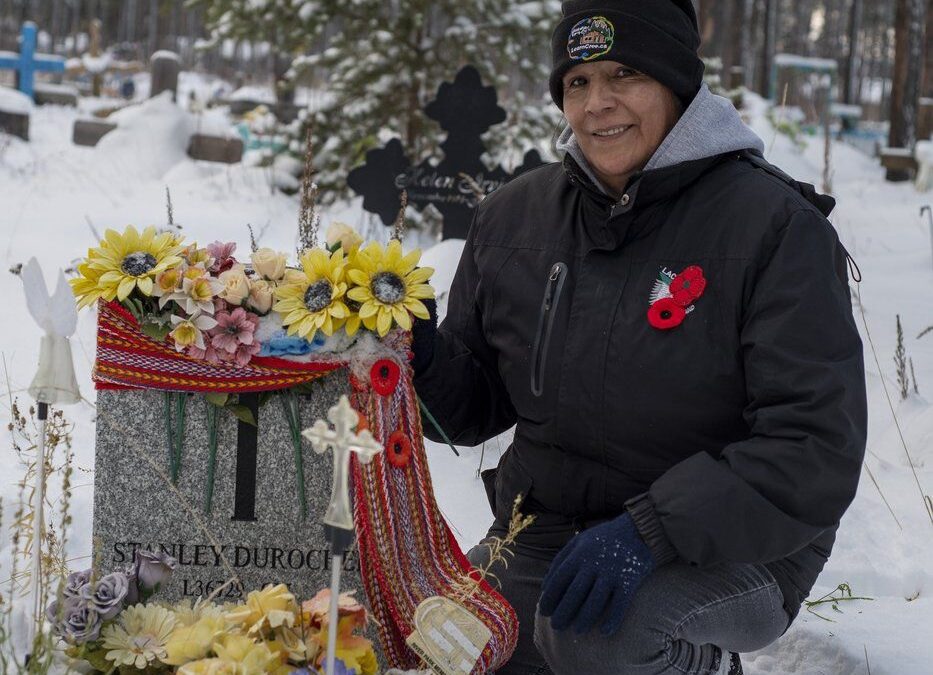Victoria Beatty kneels beside the grave of her father, Stanley Durocher. This year, a new marker honours her father’s service in WWII. (Megan Heyhurst)
By: Julia Peterson, Local Journalism Initiative Reporter
In the rows and clusters of graves in one of the cemeteries in La Ronge, Sask., a handful of new memorials stand out above the snow.
In the late afternoon sunset, the metal squares shine among the flowers and headstones.
Each has a bright red poppy in the middle, and the word “veteran” below.
Victoria Beatty always visits the cemetery on Remembrance Day to spend time at the grave of her father, Stanley Durocher; over the years, she has covered his headstone in flowers, angel figurines and a Métis sash.
This year, she also came on Nov. 10 to watch his new veteran’s marker being placed.
Beatty is proud of her father’s service — he was “out there fighting for our freedom and for us to keep living the way we do,” she says — but some of her most cherished moments with him were the times he spent with her two oldest children before his death.
“Dad loved kids,” she says. “He really loved kids. He was gentle with all his grandchildren. He’d even sit on the floor and play Legos with them, like a big kid. He was just a big teddy bear.”
When she looks at the marker, she feels like it’s helping keep his memory alive.
“Dad never really told me much about the war,” she recalls. “He always said, ‘My daughter, you’ll never be old enough to hear my stories.’ But this is an honour. It means he’s still remembered.”
Kandis Riese was also eager to see the marker placed for her grandfather, Second World War RCAF veteran Walter Riese.
“I think it’s really important to honour the people who selflessly protected us, and the rights and freedoms we have now,” she says. “It’s not only part of a veteran’s personal history, that they served. It’s part of our history, of the country that we live in.”
Riese remembers her grandfather as an avid outdoorsman who fell in love with northern Saskatchewan.
“He lived for the outdoors — hunting, fishing, boating,” she sys. “That was his passion in life.”
When he returned from the war, he became a conservation officer and was sent to La Ronge. When it came time for him to transfer to another community, he decided to quit instead, and start the Aurora Theatre in town.
When Riese was a child, Remembrance Day ceremonies were held in her grandfather’s theatre.
“Seeing the elders, and the veterans — we had many, then, though of course many have now passed on — we would look at these men in awe,” she recalls.
For Riese, this memorial is also a chance to acknowledge and recognize her grandfather’s war trauma, which he carried for the rest of his life.
“My grandfather never spoke about his time in the war,” she says. “I know he lost so many young, young friends — in their early 20s — who were serving. And I cannot imagine the trauma of knowing so much death, of losing so many people your own age. And it wasn’t something that was discussed.”
Shaune Lapworth, president of the La Ronge Legion, says memorials like this are an important way to remember the community’s veterans — who they were, what they did, and how their stories are part of the fabric of La Ronge.
“Any time you’re in the cemetery, there are all kids of stories here,” he says. “As we glance down and see the shiny little marker that’s in place, it’s a chance to acknowledge that this person did serve and gave a sacrifice. A person can pause and reflect on the memory.”
